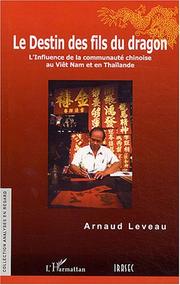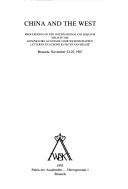| Listing 1 - 5 of 5 |
Sort by
|

ISBN: 2355960321 2747532895 Year: 2018 Publisher: Bangkok : Institut de recherche sur l’Asie du Sud-Est contemporaine,
Abstract | Keywords | Export | Availability | Bookmark
 Loading...
Loading...Choose an application
- Reference Manager
- EndNote
- RefWorks (Direct export to RefWorks)
La Chine n'est pas toujours tendre avec ses enfants. Guerre, famine, répression, cadre social trop rigide ont poussé nombre de citoyens vers d'autres terres. Aujourd'hui, les Chinois sont partout représentés. Mais c'est dans le Sud-Est asiatique que leur influence est la plus considérable. Si tous n'y font pas fortune, tant s'en faut, ils y exercent collectivement une influence économique majeure. En Thaïlande, 80 % des capitaux seraient entre les mains de nationaux aux origines chinoises plus ou moins anciennes. Mieux, ils sont maintenant devenus politiquement si influents que l'on parle parfois de Bangkok comme d'une ville chinoise. Leur présence est également très ancienne au Viêt Nam, mais leur intégration y a été bien moins aisée. A Hanoi comme à Hô Chi Minh-Ville, leur présence et les modèles qu'ils véhiculent font aujourd'hui encore l'objet de nombreux débats. Arnaud Leveau retrace ici les itinéraires des « fils du dragon », de leur terre d'origine aux pays d'accueil dont ils contribuent désormais à forger le destin.
Chinese --- Vietnam --- Thailand --- Civilization --- Chinese influences. --- Ethnology --- China --- Southeast Asia --- Chinese communities --- Viêt Nam --- networks --- Chinois --- History --- Histoire --- Chine --- Emigration and immigration --- Emigration et immigration
Book
ISBN: 9780472122714 9780472900756 0472122711 0472900757 9780472130313 0472130315 Year: 2017 Publisher: Ann Arbor University of Michigan Press
Abstract | Keywords | Export | Availability | Bookmark
 Loading...
Loading...Choose an application
- Reference Manager
- EndNote
- RefWorks (Direct export to RefWorks)
China and the West: Music, Representation, and Reception is the first book to explore how Chinese and Western musical materials and traditions-those involving instruments, melodies, rhythms, staged diversions (including operas and musical comedies), concert works, film scores, and digital recordings of several kinds-have gradually moved closer together and become increasingly accepted, as well as exploited, in Asia as well as Europe and North America. Although aimed in large part at a scholarly audience, China and the West should appeal to general readers of many kinds: those interested in politics, cultural history and theory, gender studies, sociology, theater, and media studies as well as musical composition and performance of 'classical' as well as traditional and popular kinds.
Orientalism in music. --- Exoticism in music. --- Music --- Art music --- Art music, Western --- Classical music --- Musical compositions --- Musical works --- Serious music --- Western art music --- Western music (Western countries) --- Music, Exotic --- Western influences. --- Chinese influences. --- China
Book
ISBN: 1501759760 1501759736 1501759752 1501759744 Year: 2021 Publisher: Cornell University Press
Abstract | Keywords | Export | Availability | Bookmark
 Loading...
Loading...Choose an application
- Reference Manager
- EndNote
- RefWorks (Direct export to RefWorks)
"Chinese Sympathies analyzes key German literary texts by placing scholarship on early modern Chinese empires and missionaries in conjunction with German media theory from the last twenty-five years (most notably, Friedrich Kittler). Daniel Leonhard Purdy traces a connection from Baroque-era missionary reports that accommodated Christianity with Confucianism to Goethe's concept of world literature, bridged by Enlightenment debates over cosmopolitanism and sympathy."--
German literature --- Sympathy --- Orientalism --- Civilization, Western --- Chinese influences. --- History. --- Goethe, Johann Wolfgang von, --- Philosophy. --- China --- Europe --- Intellectual life. --- East and West --- Pity --- Conduct of life --- Emotions --- Appeal to pity (Logical fallacy) --- German philosophy and China, media history of Jesuits in China, Goethe reads Chinese novels, chinese culture, The Catholic origins of Cosmopolitanism.
Book
ISBN: 9780691161396 9780691220437 0691220433 0691220433 0691235198 Year: 2021 Publisher: Princeton, N.J. Princeton University Press
Abstract | Keywords | Export | Availability | Bookmark
 Loading...
Loading...Choose an application
- Reference Manager
- EndNote
- RefWorks (Direct export to RefWorks)
A major history of Central Asia and how it has been shaped by modern world eventsCentral Asia is often seen as a remote and inaccessible land on the peripheries of modern history. Encompassing Uzbekistan, Tajikistan, Turkmenistan, Kyrgyzstan, Kazakhstan, and the Xinjiang province of China, it in fact stands at the crossroads of world events. Adeeb Khalid provides the first comprehensive history of Central Asia from the mid-eighteenth century to today, shedding light on the historical forces that have shaped the region under imperial and Communist rule.Predominantly Muslim with both nomadic and settled populations, the peoples of Central Asia came under Russian and Chinese rule after the 1700s. Khalid shows how foreign conquest knit Central Asians into global exchanges of goods and ideas and forged greater connections to the wider world. He explores how the Qing and Tsarist empires dealt with ethnic heterogeneity, and compares Soviet and Chinese Communist attempts at managing national and cultural difference. He highlights the deep interconnections between the "Russian" and "Chinese" parts of Central Asia that endure to this day, and demonstrates how Xinjiang remains an integral part of Central Asia despite its fraught and traumatic relationship with contemporary China.The essential history of one of the most diverse and culturally vibrant regions on the planet, this panoramic book reveals how Central Asia has been profoundly shaped by the forces of modernity, from colonialism and social revolution to nationalism, state-led modernization, and social engineering.
931 Internationale geschiedenis --- History of Asia --- Central Asia --- Islam --- History. --- Asia, Central --- Xinjiang Uygur Zizhiqu (China) --- Soviet Central Asia --- Tūrān --- Turkestan --- West Turkestan --- Asia --- Ethnic relations. --- Civilization --- Russian influences. --- Chinese influences. --- A History of Inner Asia. --- Chinese revolution. --- Cold War. --- Cultural Revolution. --- Eastern Turkestan. --- Eurasia. --- Mao. --- Russia and Central Asia. --- Russian Revolution. --- Shoshana Keller. --- Silk Road. --- Soviet Union. --- Svat Soucek. --- Turkestan. --- Uyghurs. --- age of empire. --- imperialism. --- nomadism. --- postcolonialism. --- postcommunism.

ISBN: 9065695915 9789065695918 Year: 1993 Publisher: Brussels AWLSK
Abstract | Keywords | Export | Availability | Bookmark
 Loading...
Loading...Choose an application
- Reference Manager
- EndNote
- RefWorks (Direct export to RefWorks)
555.41.1 --- 555.121 --- 555.122.57 --- Chinese influences --- S02/0300 --- S01/0500 --- -#SML: Chinese memorial library --- Civilization, Oriental --- Occident and Orient --- Orient and Occident --- West and East --- China: General works--Chinese culture and the West and vice-versa --- China: Bibliography and reference--Sinology, sinological institutes, proceedings of conferences --- Asian influences --- Oriental influences --- -Western influences --- East and West --- Civilization, Western --- Congresses --- Western influences --- China --- -Cina --- Kinë --- Cathay --- Chinese National Government --- Chung-kuo kuo min cheng fu --- Republic of China (1912-1949) --- Kuo min cheng fu (China : 1912-1949) --- Chung-hua min kuo (1912-1949) --- Kina (China) --- National Government (1912-1949) --- China (Republic : 1912-1949) --- People's Republic of China --- Chinese People's Republic --- Chung-hua jen min kung ho kuo --- Central People's Government of Communist China --- Chung yang jen min cheng fu --- Chung-hua chung yang jen min kung ho kuo --- Central Government of the People's Republic of China --- Zhonghua Renmin Gongheguo --- Zhong hua ren min gong he guo --- Kitaĭskai︠a︡ Narodnai︠a︡ Respublika --- Činská lidová republika --- RRT --- Republik Rakjat Tiongkok --- KNR --- Kytaĭsʹka Narodna Respublika --- Jumhūriyat al-Ṣīn al-Shaʻbīyah --- RRC --- Kitaĭ --- Kínai Népköztársaság --- Chūka Jinmin Kyōwakoku --- Erets Sin --- Sin --- Sāthāranarat Prachāchon Čhīn --- P.R. China --- PR China --- Chung-kuo --- Zhongguo --- Zhonghuaminguo (1912-1949) --- Zhong guo --- Chine --- République Populaire de Chine --- República Popular China --- Catay --- VR China --- VRChina --- 中國 --- 中国 --- 中华人民共和国 --- Jhongguó --- Bu̇gu̇de Nayiramdaxu Dundadu Arad Ulus --- Bu̇gu̇de Nayiramdaqu Dumdadu Arad Ulus --- Bu̇gd Naĭramdakh Dundad Ard Uls --- Khi︠a︡tad --- Kitad --- Dumdadu Ulus --- Dumdad Uls --- Думдад Улс --- Kitajska --- Civilization --- -Congresses. --- -Congresses --- #SML: Chinese memorial library --- Civilization, Occidental --- Occidental civilization --- Western civilization --- Cina --- China (Republic : 1949- ) --- Regional documentation --- Orient et Occident --- Congrès --- Civilisation --- Influence occidentale --- Relations --- Foreign countries --- Congresses. --- PRC --- P.R.C. --- BNKhAU --- БНХАУ --- Chinese influences.
| Listing 1 - 5 of 5 |
Sort by
|

 Search
Search Feedback
Feedback About UniCat
About UniCat  Help
Help News
News